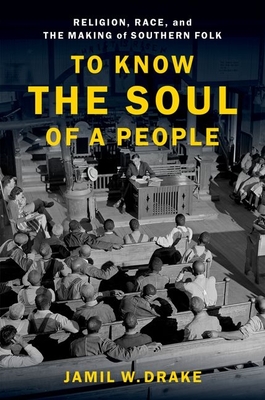To Know the Soul of a People: Religion, Race, and the Making of Southern Folk

To Know the Soul of a People: Religion, Race, and the Making of Southern Folk
To Know the Soul of a People is a history of religion and race in the agricultural South before the Civil Rights era. Jamil W. Drake chronicles a cadre of social scientists who studied the living conditions of black rural communities, revealing the abject poverty of the Jim Crow south. These university-affiliated social scientists documented shotgun houses, unsanitary privies and contaminated water, scaly hands, enlarged stomachs, and malnourished bodies. However, they also turned their attention to the spiritual possessions, chanted sermons, ecstatic singing, conjuration, dreams and visions, fortune-telling, taboos, and other religious cultures of these communities. These scholars aimed to illuminate the impoverished conditions of their subjects for philanthropic and governmental organizations, as well as the broader American public, in the first half of the 20th century, especially during the Great Depression. Religion was integral to their efforts to chart the long economic
depression across the South. From 1924 to 1941, Charles Johnson, Guy Johnson, Allison Davis, Lewis Jones, and other social scientists framed the religious and cultural practices of the black communities as "folk" practices, aiming to reform them and the broader South. Drawing on their correspondence, fieldnotes, and monographs, Drake shows that social scientists' use of "folk" reveals the religion was an important site for highlighting the supposed mental, moral, and cultural deficits of America's so-called folk population. Moreover, these social scientists did not just pioneer rural social science and reform but used their study of religion to plant the seeds of the concept that would become known as the "culture of poverty" in the latter half of the twentieth century. To Know the Soul of a People is an exciting intellectual history that invites us to explore the knowledge that animated the earnest yet shortsighted liberal efforts to reform black and impoverished communities.
PRP: 304.22 Lei
Acesta este Pretul Recomandat de Producator. Pretul de vanzare al produsului este afisat mai jos.
273.80Lei
273.80Lei
304.22 LeiLivrare in 2-4 saptamani
Descrierea produsului
To Know the Soul of a People is a history of religion and race in the agricultural South before the Civil Rights era. Jamil W. Drake chronicles a cadre of social scientists who studied the living conditions of black rural communities, revealing the abject poverty of the Jim Crow south. These university-affiliated social scientists documented shotgun houses, unsanitary privies and contaminated water, scaly hands, enlarged stomachs, and malnourished bodies. However, they also turned their attention to the spiritual possessions, chanted sermons, ecstatic singing, conjuration, dreams and visions, fortune-telling, taboos, and other religious cultures of these communities. These scholars aimed to illuminate the impoverished conditions of their subjects for philanthropic and governmental organizations, as well as the broader American public, in the first half of the 20th century, especially during the Great Depression. Religion was integral to their efforts to chart the long economic
depression across the South. From 1924 to 1941, Charles Johnson, Guy Johnson, Allison Davis, Lewis Jones, and other social scientists framed the religious and cultural practices of the black communities as "folk" practices, aiming to reform them and the broader South. Drawing on their correspondence, fieldnotes, and monographs, Drake shows that social scientists' use of "folk" reveals the religion was an important site for highlighting the supposed mental, moral, and cultural deficits of America's so-called folk population. Moreover, these social scientists did not just pioneer rural social science and reform but used their study of religion to plant the seeds of the concept that would become known as the "culture of poverty" in the latter half of the twentieth century. To Know the Soul of a People is an exciting intellectual history that invites us to explore the knowledge that animated the earnest yet shortsighted liberal efforts to reform black and impoverished communities.
Detaliile produsului








